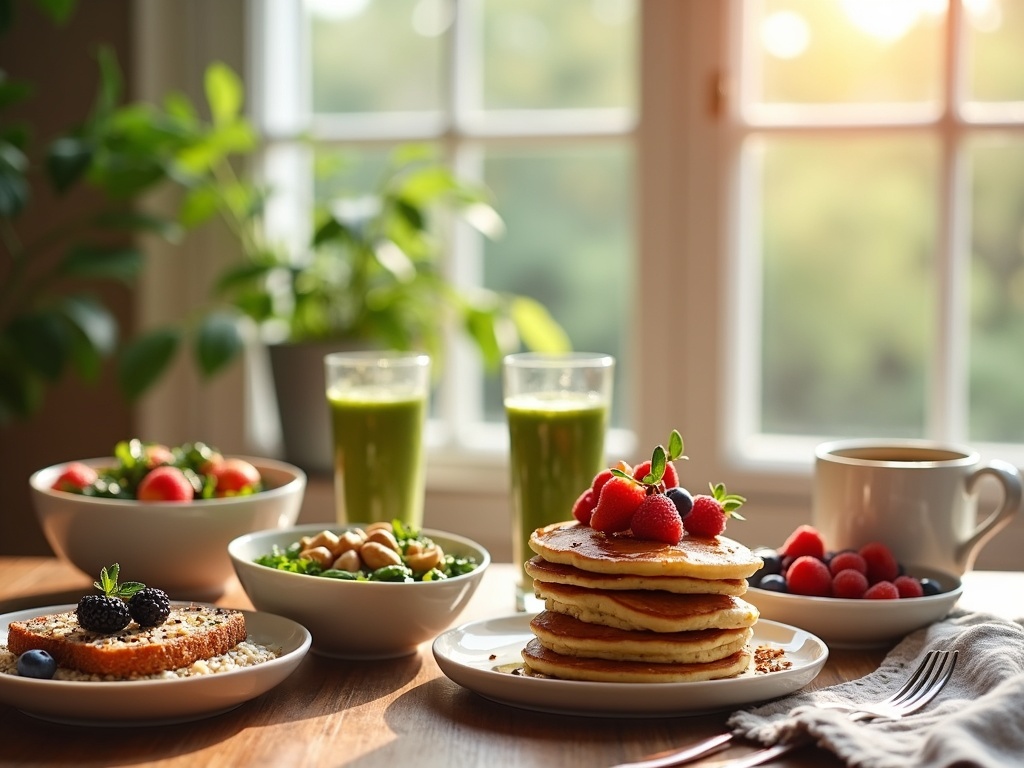Plant based breakfasts deliver major health advantages, with studies indicating an 18% reduced heart disease risk versus meat-inclusive diets. These nutrient-rich morning options pack plenty of fiber, essential vitamins, and healthy fats alongside powerful plant compounds that combat inflammation and lower risks for chronic conditions like type 2 diabetes.
Find In This Article
Key Takeaways
- Plant-based breakfasts provide substantial fiber (5-10g per serving) compared to traditional egg and bacon breakfasts that offer virtually no fiber.
- Switching to plant-based morning meals can reduce food-related emissions by up to 73%, making a significant environmental impact.
- Options like smoothies, overnight oats, and tofu scrambles deliver impressive protein content (up to 15g per serving) while requiring minimal preparation time.
- Stocking your pantry with whole grains, nuts, seeds, plant milks, and protein alternatives creates a foundation for effortless plant-based breakfasts.
- A gradual transition approach works best, starting with simple substitutions like swapping dairy milk for plant alternatives before moving to fully plant-based meals.
Why Plant-Based Breakfasts Are Better For You
Starting your day with a plant-based breakfast can transform your health in ways you might not expect. Research from the American Journal of Clinical Nutrition shows that people who eat plant-based diets have an 18% lower risk of heart disease compared to omnivores. This significant reduction makes a compelling case for swapping traditional breakfast options for more plant-focused alternatives.
Nutritional Powerhouses
Plant-based breakfasts pack a serious nutritional punch. They’re typically high in fiber, essential vitamins, and healthy fats that support both digestive and heart health. When I make the switch to nutritious plant-based breakfast options, I notice improvements in energy levels and overall wellbeing.
The fiber content is particularly impressive. According to the Institute of Medicine, women should aim for 25g of fiber daily, while men need about 38g. A single plant-based breakfast can provide a substantial portion of these requirements. For example, savory oatmeal dishes or Bircher muesli preparations can deliver 5-10g of fiber before you’ve even started your day.
Compare this to traditional breakfasts centered around eggs and beef bacon, which provide virtually no fiber while delivering high amounts of saturated fat. These conventional options might taste good, but they don’t offer the same protective benefits for your heart and digestive system.
Disease Prevention Benefits
The advantages of plant-based breakfasts extend beyond immediate nutritional benefits. They play a key role in reducing the risk of several chronic conditions, including type 2 diabetes. Plants contain thousands of phytonutrients – compounds that help fight inflammation and oxidative stress in the body.
When I incorporate more plant foods into my morning meal routine, I’m not just feeding myself – I’m investing in long-term health protection. The combination of antioxidants, fiber, and healthy plant compounds creates a protective effect that animal-based breakfasts simply can’t match.
Plant-based options like creative pancake variations or quick pancake recipes using plant milks and whole grains can be just as satisfying as their traditional counterparts while offering superior health benefits. They’re easier on your digestive system, kinder to your heart, and more effective at maintaining steady blood sugar levels throughout the morning.
By making this simple dietary shift at breakfast, you’re taking a powerful step toward disease prevention that will benefit your body for years to come.
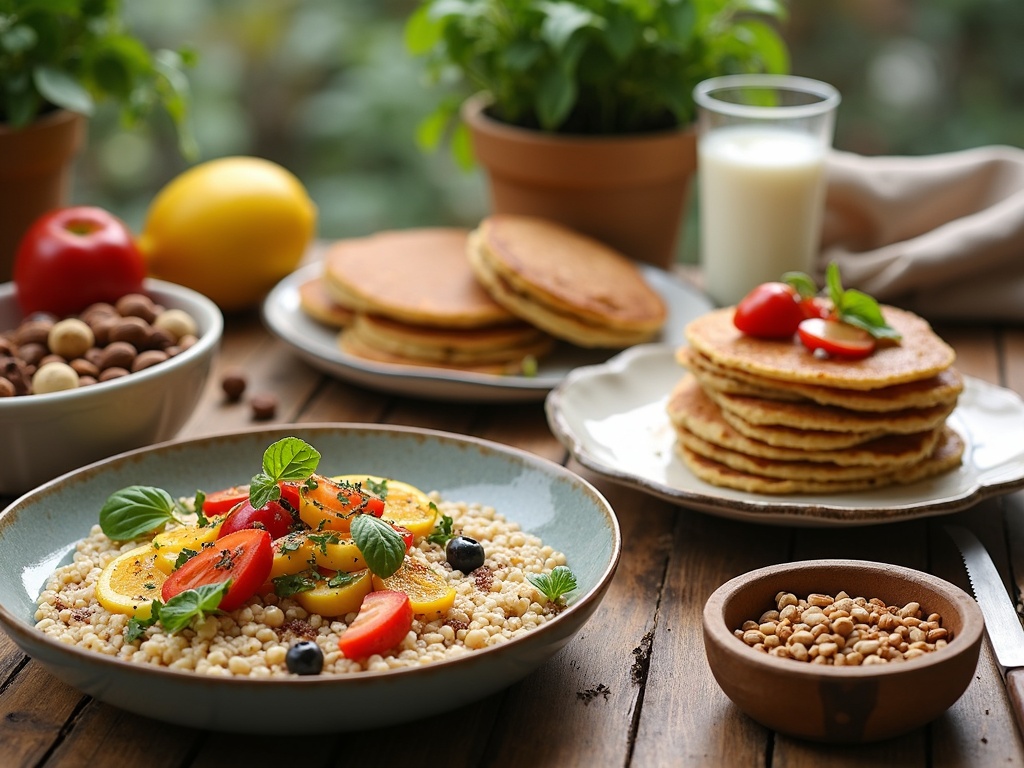
Quick and Easy Plant-Based Breakfast Ideas That Pack a Punch
Starting the day with a nutritious plant-based breakfast doesn’t have to be complicated. I’ve gathered some simple yet powerful options that’ll fuel your morning without requiring hours in the kitchen.
Nutrient-Dense Morning Starters
Smoothies are my go-to when time is tight but nutrition can’t be compromised. A blend of spinach, mixed berries, and nut milk provides an impressive 25% of your daily vitamins in just one serving. I like to add a tablespoon of ground flaxseed for omega-3s and a banana for natural sweetness.
For a make-ahead option, overnight oats deliver serious staying power with approximately 15g of protein per serving when made with almond milk and a handful of chopped nuts. What I love most about this breakfast is how it practically prepares itself while I sleep! If you prefer your oats warm, traditional savory oatmeal contains about 4g of fiber per serving, helping you stay full until lunch.
Chia pudding is another fantastic option requiring minimal morning effort. Just mix 3 tablespoons of chia seeds with a cup of plant milk and your favorite sweetener the night before. By morning, you’ll have a pudding-like breakfast containing 10g of fiber and 5g of protein.
For those who enjoy something more substantial, a tofu scramble delivers approximately 14g of protein per serving. I sauté crumbled firm tofu with turmeric (for color), nutritional yeast (for a cheesy flavor), and your choice of veggies for a filling healthy breakfast option that comes together in under 10 minutes.
Avocado toast remains a classic for good reason. A slice of whole grain toast topped with half an avocado provides 7g of fiber and healthy fats that keep hunger at bay. I like to add a sprinkle of everything bagel seasoning and a squeeze of lemon for extra flavor.
For a weekend treat that still maintains nutritional integrity, try quick pancake recipes using mashed banana, oat flour, and a splash of plant milk. Each serving contains approximately a healthy 5g of fiber and makes for a delicious breakfast that feels indulgent without the sugar crash.
Bircher muesli is another fantastic option with 8g of protein per serving when made with oats, grated apple, and a mix of seeds and nuts.
For something truly special yet still nutritious, ube mochi pancakes offer a unique twist on traditional breakfast fare while still delivering fiber and antioxidants from the purple yam.
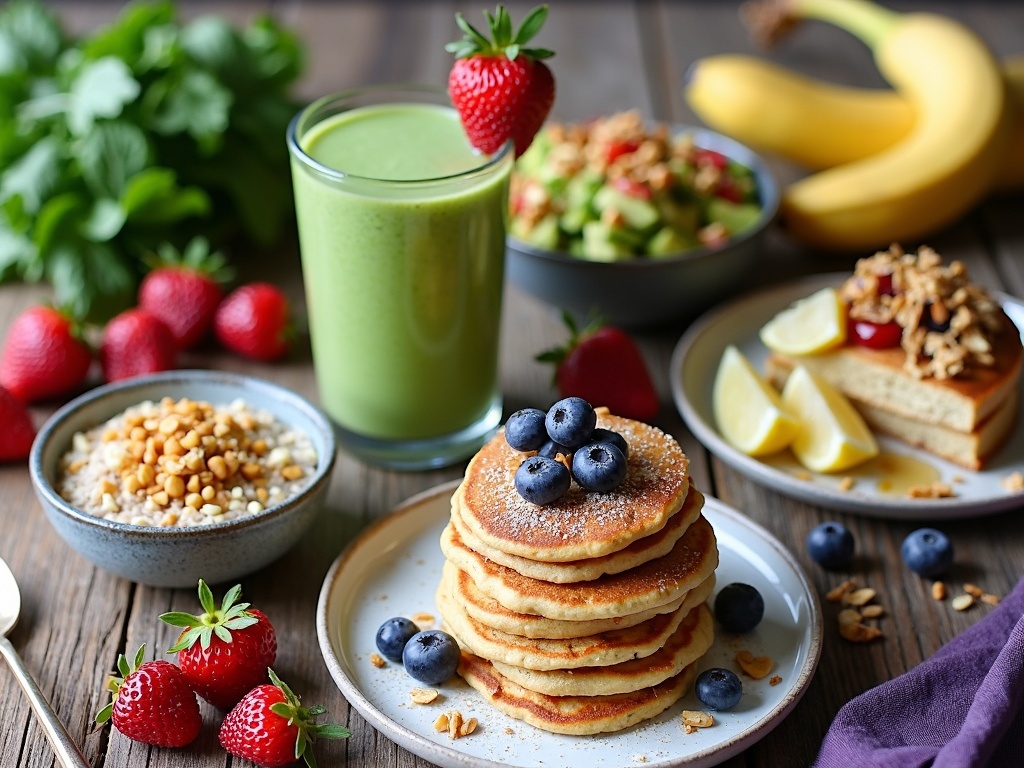
Make Your Breakfast Work Harder for the Planet
Starting my day with a plant-based breakfast has become more than just a health choice—it’s my small contribution to environmental sustainability. The evidence supporting this shift is compelling. According to an Oxford University study, adopting plant-based diets can slash food-related emissions by a whopping 73%. That’s a significant impact from simply changing what’s on my breakfast plate.
Environmental Impact of Breakfast Choices
The livestock industry bears a heavy responsibility for our planet’s health, accounting for 14.5% of global greenhouse gas emissions. When I compare the carbon footprint of different breakfast options, the numbers tell a clear story. A typical avocado toast produces significantly fewer emissions than a traditional breakfast with animal products. Even with considerations about avocado farming and transportation, plant-based options consistently come out ahead environmentally.
I’ve found that making nutritious plant-based breakfast choices doesn’t mean sacrificing flavor or satisfaction. In fact, the variety available has exploded as more people recognize both the personal and planetary benefits of reducing animal product consumption. The plant-based food market reflects this growing awareness, with projections showing it reaching $74 billion by 2027.
Beyond carbon emissions, my breakfast choices affect biodiversity and animal welfare. Industrial animal agriculture requires vast land areas—often created through deforestation—which destroys natural habitats and reduces biodiversity. By choosing plant-based breakfasts, I’m supporting farming practices that typically require less land and fewer resources.
Delicious Planet-Friendly Breakfast Ideas
I’ve discovered several breakfast options that taste great while treading lightly on the earth:
- Oatmeal has become my reliable standby. Savory oatmeal recipes with vegetables and herbs offer a creative twist on this classic. The beauty of oats lies in their minimal environmental footprint and impressive versatility.
- For mornings when I have more time, unique pancake variations made with plant milks and flours satisfy my cravings for something special. Adding fruits, nuts, and seeds boosts both nutrition and flavor.
- Overnight preparations like Bircher muesli save me time while delivering exceptional taste and nutrition. Soaking oats and seeds activates their nutrients while creating a creamy texture without dairy.
- Toast-based breakfasts with hummus, nut butters, or bean spreads provide protein without animal products. I’ve found these options incredibly satisfying and simple to prepare, even on busy mornings.
- Smoothie bowls packed with seasonal fruits, vegetables, and plant-based protein sources offer refreshing variety. They’re perfect for using produce that might otherwise go to waste.
Making the switch to plant-based breakfast options doesn’t require radical changes all at once. I started by implementing Meatless Monday breakfasts, then gradually increased plant-based meals throughout my week. Small, consistent changes add up to meaningful environmental impact over time.
For quick mornings, I keep ingredients for easy pancakes that use plant milks instead of dairy. With simple swaps like this, I maintain convenience while reducing my environmental footprint.
The growing availability of plant-based ingredients in mainstream stores has made this transition much easier than it would have been even five years ago. From oat milk to chickpea flour, ingredients that once required special shopping trips are now within easy reach.
By making more environmentally conscious breakfast choices, I’m contributing to a more sustainable food system without feeling deprived. The variety, flavor, and satisfaction I get from plant-based breakfasts prove that eating for the planet doesn’t mean sacrificing personal enjoyment.
How to Stock Your Plant-Based Pantry
Starting the day with a nutrient-rich plant-based breakfast becomes effortless when your pantry is properly stocked. I’ve learned that having the right ingredients on hand eliminates morning stress and helps create satisfying meals in minutes.
Building Your Plant-Based Breakfast Arsenal
The foundation of any good plant-based pantry starts with whole grains. I always keep rolled oats for savory oatmeal recipes, steel-cut oats for heartier breakfasts, and quinoa for protein-packed morning bowls. Whole grain flours are essential for homemade pancake recipes and waffles.
Nuts and seeds add crucial healthy fats and protein to your morning meals. My must-haves include:
- Chia seeds for puddings and as egg replacers
- Ground flaxseed for smoothie bowls and baking
- Walnuts, almonds, and pecans for toppings and homemade granola
- Hemp seeds for protein-boosting sprinkles
Plant milks have transformed breakfast options for those avoiding dairy. Oat milk works wonderfully in coffee and for creamy overnight muesli, while almond milk is perfect for lighter applications. Soy milk offers the highest protein content of commonly available plant milks.
Fresh produce elevates any plant-based breakfast. Bananas, berries, and apples store well and add natural sweetness. For vegetables, spinach, avocados, and sweet potatoes are incredibly versatile morning ingredients. I keep frozen berries and sliced bananas on hand for quick smoothies when fresh options aren’t available.
For protein-rich alternatives, silken tofu blends beautifully into smoothies and can create egg-like textures in scrambles. Firm tofu works well in breakfast burritos. Black beans and chickpeas can transform morning bowls into sustaining meals. Nutritional yeast adds a cheesy flavor to savory dishes while boosting B vitamins.
Some reliable brands worth exploring include Silk and Oatly for plant milks, Bob’s Red Mill for quality grains, and Simple Truth Organic for affordable pantry staples. For special morning treats, I recommend trying Just Egg for realistic plant-based scrambles or Good Catch for seafood-free breakfast options.
Proper storage extends the life of your plant-based ingredients. Store nuts and seeds in airtight containers in the refrigerator to prevent rancidity. Mason jars make perfect vessels for overnight oats and pancake mixes. Freeze bread products like English muffins or bagels to maintain freshness, and use produce drawers with adjusted humidity settings to maximize vegetable and fruit life.
With these essentials on hand, creating varied and satisfying plant-based breakfasts becomes an enjoyable part of your morning routine.
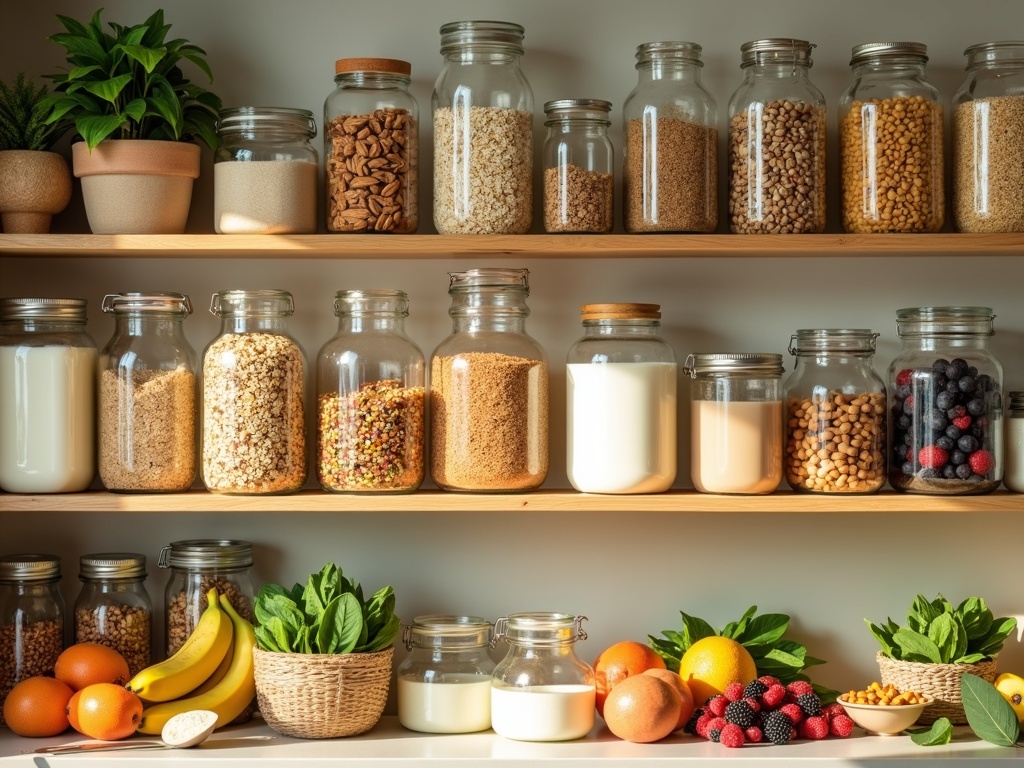
Making the Switch Without the Stress
Transitioning to a plant-based breakfast routine doesn’t have to feel like climbing a mountain. I’ve found that with some simple planning and a gradual approach, making the switch can be surprisingly easy and enjoyable. Let’s break down how to make this shift without adding extra stress to your mornings.
Smart Planning for Seamless Mornings
Weekly meal planning has been my secret weapon for maintaining a consistent plant-based breakfast routine. I set aside 30 minutes each weekend to map out my breakfast menu for the coming week. This simple habit eliminates daily decision fatigue and ensures I have all necessary ingredients on hand.
Here are some effective strategies that have helped me stay organized:
- Create a rotating 2-week template with your favorite breakfasts
- Designate specific days for certain meal types (e.g., Monday for savory oatmeal bowls, Wednesday for smoothies)
- Include a shopping list section on your template
- Leave room for one “wild card” day to try new recipes
Batch cooking has also been a game-changer for my plant-based journey. Every Sunday, I prepare components that can be mixed and matched throughout the week. For example, I’ll make a large batch of overnight oats or muesli that lasts 3-4 days, pre-chop fruits for quick smoothies, or bake a tray of sweet potatoes for savory breakfast bowls.
Tracking nutrients might sound tedious, but apps like MyFitnessPal have made it simple. During my transition, I used the app for two weeks to ensure I was getting enough protein, B12, and iron – common concerns when shifting to plant-based eating. This data helped me adjust my breakfast choices without overthinking every meal.
Gradual Shifts and Smart Substitutions
I found that following a gradual timeline worked better than an overnight change. My transition looked something like this:
- Week 1-2: Replace dairy milk with plant alternatives in existing breakfast recipes
- Week 3-4: Introduce two fully plant-based breakfasts per week (like pancakes made with plant milk)
- Week 5-6: Increase to four plant-based breakfasts weekly
- Week 7-8: Full transition with occasional non-plant options when desired
This approach gave my taste buds and digestion time to adjust, making the switch feel natural rather than forced.
The breakfast table offers countless opportunities for simple substitutions. I’ve discovered several swaps that deliver the familiar flavors and textures of traditional breakfast without animal products:
- Eggs → Tofu scramble (with turmeric for color and black salt for egg-like flavor)
- Yogurt → Coconut or almond milk yogurt topped with fresh fruit
- Butter → Avocado spread or nut butters on toast
- Honey → Maple syrup or date syrup
- Cream cheese → Cashew-based spread (easily made at home)
- Bacon → Tempeh strips with maple and liquid smoke
One particularly delightful discovery was plant-based pancakes that turned out even fluffier than traditional recipes. I found that adding a tablespoon of apple cider vinegar to plant milk creates a perfect “buttermilk” substitute that makes pancakes rise beautifully.
The key to success has been focusing on addition rather than subtraction. Instead of dwelling on what I’m removing from my breakfast routine, I’ve concentrated on the incredible variety of new flavors and textures I’m gaining. This mindset shift transformed the experience from one of restriction to one of exploration and discovery.
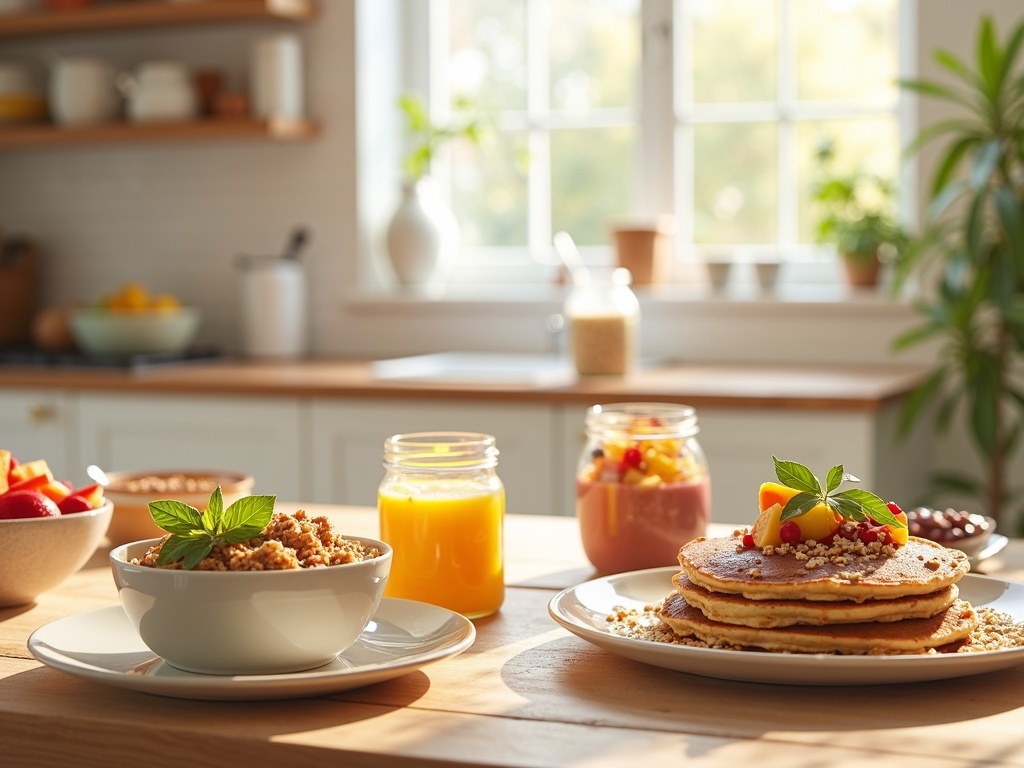
Sources:
The American Journal of Clinical Nutrition
The Nutrition Source: Healthy Eating, Harvard T.H. Chan School of Public Health
Oxford University Study on Diet and Environment
Plant-Based Food Association Research Report
Institute of Medicine Dietary Guidelines

